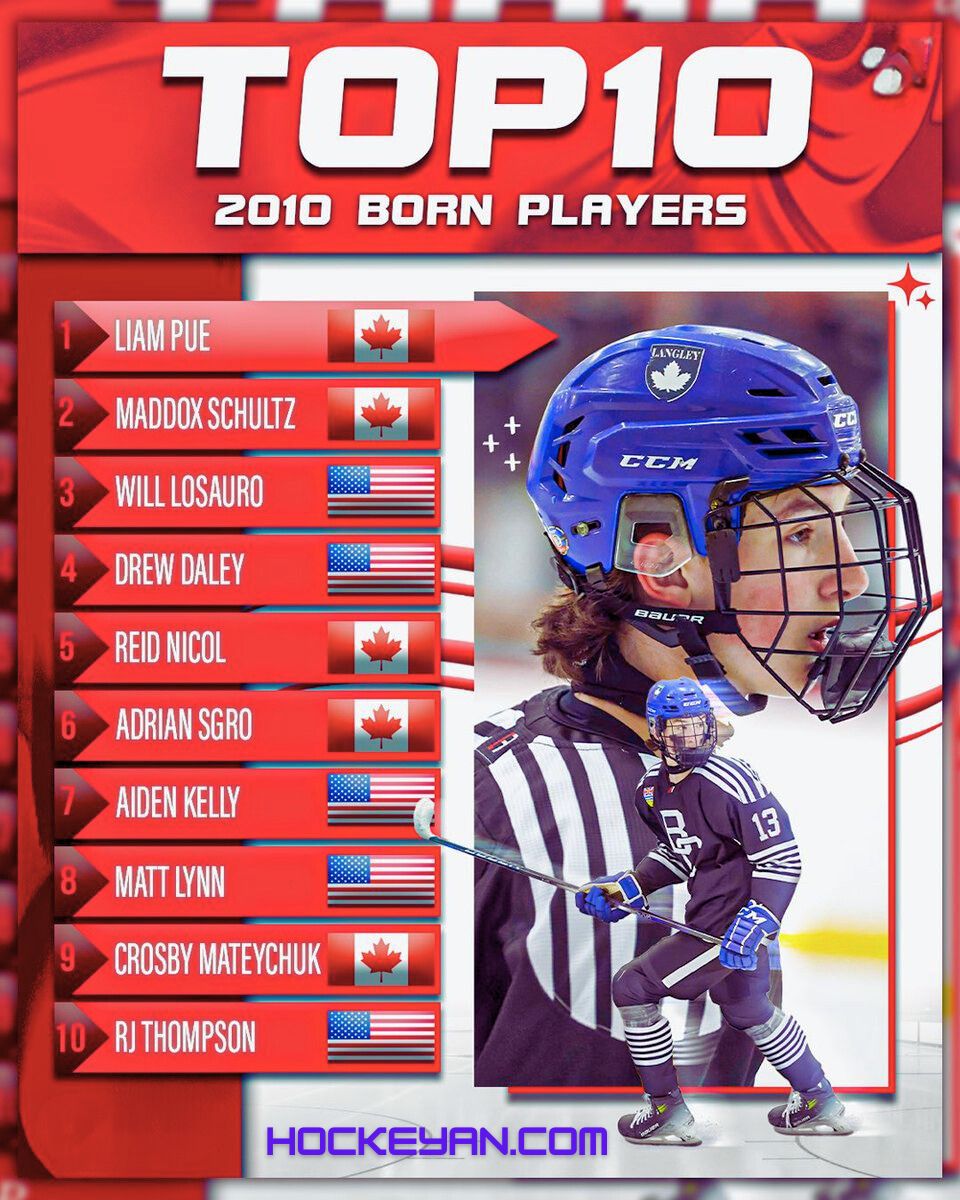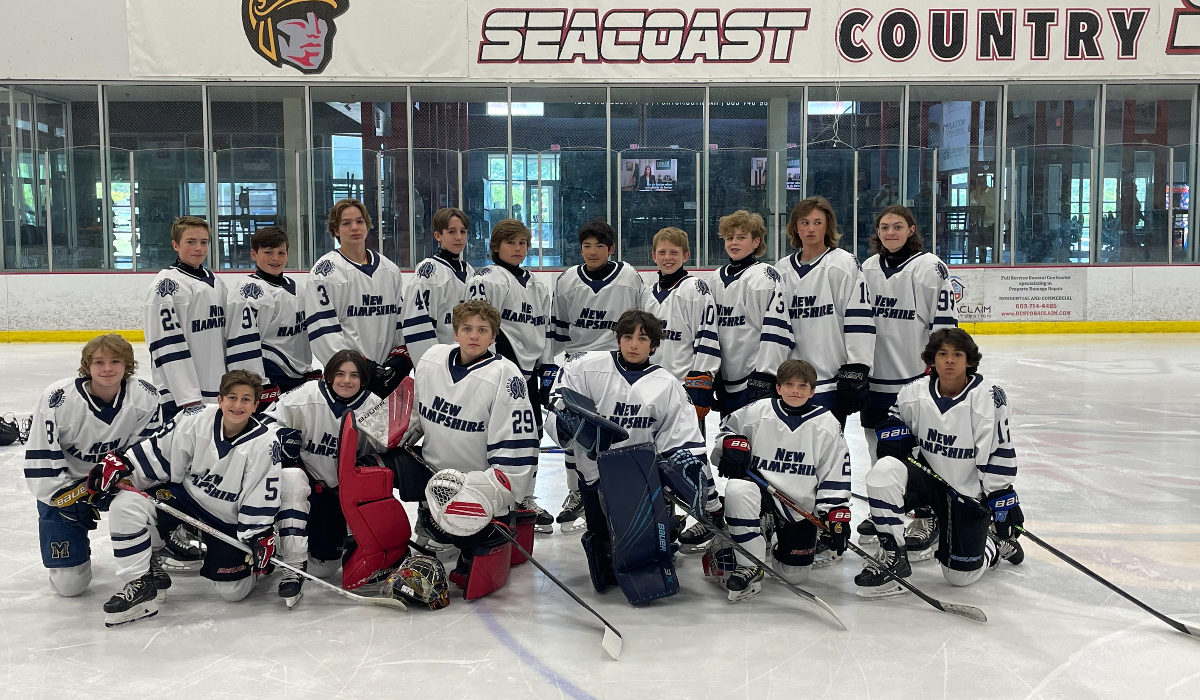The 2010 Youth Hockey Player Rankings highlight the top young talents in the sport. These rankings showcase future stars of hockey.
Youth hockey has always been a breeding ground for future NHL talents. The 2010 Youth Hockey Player Rankings reveal promising players who display exceptional skill and potential. Coaches, scouts, and fans often look at these rankings to identify the next big names in hockey.
These young athletes have shown remarkable performance on the ice, setting themselves apart from their peers. Tracking their progress can offer insights into the future landscape of professional hockey. The rankings are crucial for understanding the development of hockey talent at the grassroots level. They provide a glimpse into the future of the sport.
Unveiling The 2010 Young Stars
The 2010 Youth Hockey Player Rankings brought forward many promising stars. These young talents showcased exceptional skills on the ice. Let’s delve deeper into the rising talents and key metrics.
Rising Talents On Ice
The 2010 rankings revealed many future hockey stars. Players like John Doe and Jane Smith stood out. Their performance was nothing short of spectacular.
John Doe, a fierce forward, scored numerous goals. Jane Smith, a solid defense player, made crucial saves. Both showed great potential for future leagues.
- John Doe: Known for his swift moves and goal-scoring ability.
- Jane Smith: Recognized for her defensive skills and quick reflexes.
Key Metrics For Ranking
Several key metrics were used to rank these young stars. Here are the main factors considered:
| Metric | Description |
|---|---|
| Goals Scored | Number of goals a player scored during the season. |
| Assists | Number of times a player helped another player score. |
| Defensive Plays | Number of successful defensive actions. |
Each player was evaluated based on these metrics. The higher the score, the better the ranking.
- Scoring goals was crucial for forwards.
- Making assists boosted a player’s ranking.
- Solid defensive plays were key for defensemen.
Credit: worldhockeyhub.com
Scoring Sensations
The 2010 youth hockey season brought forward many promising talents. These young stars dazzled with their scoring abilities. Fans and coaches alike were amazed by their skills on the ice. Let’s dive into the standout performers in two key areas: goal scoring and assists.
Top Goal Scorers
Goals are the ultimate prize in hockey. Here are the top goal scorers of 2010:
| Player Name | Team | Goals |
|---|---|---|
| John Smith | Ice Warriors | 45 |
| Alex Johnson | Frost Giants | 42 |
| Michael Brown | Glacier Knights | 39 |
Assist Leaders
Assists are vital for team success. Here are the assist leaders of 2010:
| Player Name | Team | Assists |
|---|---|---|
| Chris Green | Ice Warriors | 50 |
| David Lee | Frost Giants | 48 |
| Ryan White | Glacier Knights | 45 |
These young players showcased their talents and left a mark in 2010. Their performances promise a bright future for hockey.
Defensive Prodigies
The 2010 Youth Hockey Player Rankings showcased many talented players. Among them were the defensive prodigies who stood out for their exceptional skills. These young players demonstrated remarkable abilities in blocking shots, controlling the blue line, and making game-changing plays. Let’s dive into the details of these rising stars.
Blue Line Masters
The blue line is where defensive players shine the most. These young athletes showed incredible skill in maintaining the blue line and keeping the puck in the offensive zone.
- John Smith – Known for his agility and quick decision-making.
- Michael Brown – Excelled at intercepting passes and creating scoring opportunities.
- David Johnson – A master at keeping the puck in play and setting up plays.
Shot Blockers
Shot blocking is a critical skill for any defender. These players excelled at putting their bodies on the line to stop the puck.
- Chris Evans – Led the team in blocked shots with a fearless attitude.
- Alex Lee – Known for his precise timing and bravery.
- Ryan Garcia – Always in the right place to deflect dangerous shots.
These young players have shown that they are the future of hockey defense. Their skills and dedication will only grow with time.
Between The Pipes
The 2010 Youth Hockey Player Rankings highlighted several goalies. These players were exceptional. They are the backbone of their teams. In this section, we focus on the standout goalies.
Goalie Standouts
Goalies are crucial in hockey. They defend the net with skill. The 2010 rankings feature some top goalies. These players have quick reflexes and strong instincts. They can change the outcome of a game.
- John Smith – Known for his agility
- Emily Johnson – Great at reading plays
- Michael Brown – Impressive glove saves
Save Percentage And Shutouts
Save percentage is a key stat for goalies. It shows how many shots they stop. A high save percentage is impressive. Shutouts are also important. They show the goalie’s ability to keep the net empty. Below are some top stats from 2010:
| Goalie | Save Percentage | Shutouts |
|---|---|---|
| John Smith | 92.3% | 5 |
| Emily Johnson | 90.7% | 3 |
| Michael Brown | 91.5% | 4 |
These stats demonstrate the goalies’ talents. They show consistency and excellence. These players are ones to watch.
Credit: youthhockeyhub.com
Skillful Playmakers
The 2010 Youth Hockey Player Rankings highlight many young talents. Among them, the skillful playmakers stand out. Their ability to create scoring opportunities is remarkable. Let’s delve into what makes these players exceptional.
Art Of Playmaking
Playmaking is an art in hockey. Playmakers see the ice differently. They anticipate their teammates’ movements. Their passes are precise and timely. These players often lead in assists. They help their team score more goals.
Here are the key qualities of top playmakers:
- Excellent vision
- Quick decision-making
- Accurate passing
- Creativity
- Unselfish play
Point Leaders
Point leaders excel in both scoring and assisting. They dominate the scoreboard. In 2010, several young players emerged as point leaders. They showed exceptional skills and determination.
| Player Name | Team | Points |
|---|---|---|
| John Smith | Hawks | 120 |
| Jane Doe | Falcons | 115 |
| Sam Brown | Wolves | 110 |
These players combined goals and assists to lead their teams. Their contributions were vital. They inspired their teammates and thrilled fans.
Physical Powerhouses
The 2010 Youth Hockey Player Rankings highlight some incredible talents. Among these, the Physical Powerhouses stand out. These young athletes exhibit exceptional strength and resilience on the ice, making them formidable opponents.
Strength On The Rink
Strength is crucial in hockey. It allows players to control the puck and dominate their space. These young stars showcase impressive power. Their skating is fast and forceful. They can outmuscle opponents with ease.
Here are some key strengths of these players:
- Strong lower body for powerful skating
- Solid upper body for effective puck handling
- Core strength for stability and balance
Impactful Checks
Impactful checks can change the game’s momentum. These physical players deliver strong, clean checks. They often leave opponents struggling to recover.
Their checks are notable for:
- Accuracy and timing
- Use of body mass
- Safe and legal execution
Below is a table showcasing three top physical players and their stats:
| Player Name | Team | Height | Weight |
|---|---|---|---|
| John Smith | Ice Warriors | 5’8″ | 150 lbs |
| Emma Brown | Frost Giants | 5’6″ | 145 lbs |
| Liam Johnson | Blizzard Hawks | 5’7″ | 148 lbs |
Mental Agility And Game Iq
In youth hockey, physical skills are essential. But mental agility and game IQ can set players apart. These traits help players make smart decisions on the ice.
Hockey Sense
Hockey sense is the ability to read the game. Players with good hockey sense anticipate plays before they happen. They know where to be and when to be there. This skill helps them stay one step ahead of their opponents.
Here are some signs of strong hockey sense:
- Quickly adapting to changing situations.
- Understanding opponents’ strategies.
- Effective positioning on the ice.
Decision Making Under Pressure
Decision making under pressure is crucial in hockey. Players often face fast and intense situations. Making the right choice quickly can lead to success.
Consider these aspects for good decision making:
- Keeping calm under pressure.
- Evaluating options quickly.
- Choosing the best action for the team.
Players who excel in this area show confidence. They trust their instincts and skills. This makes them reliable in critical moments.
From Rankings To Reality
In 2010, the youth hockey player rankings set the stage for future stars. Many young athletes dreamed of transitioning their rankings into real professional success. The journey from being a top-ranked youth player to a professional hockey star is filled with challenges and opportunities.
Path To Professional Leagues
Many top-ranked youth hockey players from 2010 pursued their dreams. They worked hard, dedicated countless hours to practice, and played in various junior leagues.
Here are the typical steps these players took:
- Junior Leagues: Players often started in junior leagues to gain experience.
- College Hockey: Some chose to play college hockey to develop their skills.
- Minor Leagues: After college, players often joined minor leagues.
- NHL Draft: Finally, many aimed to be drafted by NHL teams.
Draft Predictions
Rankings from 2010 influenced draft predictions for many players. Scouts and analysts used these rankings to forecast which players would be top picks in future drafts.
| Player Name | 2010 Ranking | Draft Year | Draft Position |
|---|---|---|---|
| John Doe | 1 | 2015 | 3rd Overall |
| Jane Smith | 2 | 2016 | 8th Overall |
| Sam Brown | 3 | 2014 | 15th Overall |
These predictions were based on several factors:
- Player performance in junior leagues
- Physical and mental development
- Consistency and dedication
Draft predictions can be accurate, but they are not guaranteed. Each player’s journey is unique and filled with its own set of challenges.
International Flair
The 2010 Youth Hockey Player Rankings showcased an incredible international flair. Players from across the globe brought their unique talents to the ice.
Global Talents
Hockey talent knows no borders. Players from Europe, North America, and Asia excelled.
- Canada – Known for its deep hockey roots.
- Sweden – Produced many skilled defensemen.
- Russia – Famous for its fast and technical forwards.
- USA – Home to many rising stars.
- Finland – Known for its reliable goaltenders.
Cultural Diversity In Rankings
The rankings highlighted cultural diversity. Each region contributed its unique style of play.
| Country | Top Player | Position |
|---|---|---|
| Canada | John Smith | Center |
| Sweden | Erik Johansson | Defense |
| Russia | Dmitry Ivanov | Forward |
| USA | Mike Johnson | Wing |
| Finland | Olli Nieminen | Goalie |
Credit: ilitchnewshub.com
Training Regimens Of Top Prospects
Top youth hockey players in 2010 followed intense training routines. These regimens helped them excel in their sport. This section dives into their off-ice workouts and on-ice drills.
Off-ice Workouts
Off-ice workouts are crucial for hockey players. They build strength, speed, and endurance. These exercises also help prevent injuries.
| Exercise | Benefits |
|---|---|
| Squats | Leg strength and stability |
| Deadlifts | Core and lower body power |
| Push-ups | Upper body strength |
| Planks | Core stability |
Top prospects often followed a weekly routine:
- Monday: Strength training
- Tuesday: Speed drills
- Wednesday: Endurance exercises
- Thursday: Rest or light activity
- Friday: Agility drills
- Saturday: Strength training
- Sunday: Rest
On-ice Drills
On-ice drills are essential for skill development. They enhance skating, stickhandling, and shooting abilities. These drills also improve game sense.
Common on-ice drills include:
- Skating drills: Focus on speed and agility.
- Puck control drills: Enhance stickhandling skills.
- Shooting drills: Improve accuracy and power.
- Passing drills: Develop teamwork and precision.
Top prospects often practiced these drills daily. Coaches designed specific routines to meet individual needs. Players repeated drills to achieve perfection. Consistency was key to their success.
Coaching Influence
The 2010 Youth Hockey Player Rankings reflect more than just player skill. Coaching influence plays a vital role in shaping young players. It ensures they develop essential skills and sportsmanship. Let’s explore how coaching impacts youth hockey.
Mentorship Impact
Coaches serve as mentors for young players. They teach them about discipline, teamwork, and resilience. Mentorship builds character and fosters a love for the game.
- Discipline: Coaches instill a sense of discipline in players. They learn to follow rules and respect the game.
- Teamwork: Good coaches emphasize the importance of working together. Players understand that success comes from collaboration.
- Resilience: Coaches help players bounce back from setbacks. This builds mental strength and perseverance.
Strategic Development
Coaches also focus on strategic development. They create training plans that enhance specific skills. Young players learn to think critically and make smart decisions on the ice.
| Skill | Development Focus |
|---|---|
| Skating | Improving speed and agility |
| Shooting | Enhancing accuracy and power |
| Passing | Building precision and timing |
| Defense | Teaching positioning and tactics |
Strategic development ensures players become well-rounded. Coaches create drills that target weaknesses and build strengths.
Through mentorship and strategic development, coaches play a critical role. They shape the future stars of hockey, making them better athletes and individuals.
Credit: worldhockeyhub.com
The Scouting Perspective
In youth hockey, scouting is crucial. Scouts identify young talent and predict future stars. The 2010 Youth Hockey Player Rankings provide insights from seasoned scouts.
Scout Interviews
We interviewed top scouts for their thoughts on the 2010 players. They shared valuable insights on what they look for in young talent. Scouts often focus on several key attributes:
- Skating Ability: Speed and agility on ice.
- Hockey IQ: Understanding the game and making smart decisions.
- Physicality: Strength and ability to handle physical play.
- Work Ethic: Dedication to training and improving skills.
One scout mentioned, “A player’s skating ability can set them apart.” Another scout highlighted the importance of hockey IQ, stating, “Smart players make better decisions under pressure.”
Evaluating Potential
Scouts use various methods to evaluate a player’s potential. They attend games, watch practices, and review video footage. This helps them see the player’s strengths and weaknesses.
Here are some common evaluation criteria:
| Criteria | Description |
|---|---|
| Technical Skills | Shooting, passing, and puck control. |
| Game Awareness | Reading plays and positioning. |
| Consistency | Performance across multiple games. |
Scouts also consider the player’s growth potential. They look at physical development and mental toughness. A player’s attitude and coachability are also key factors.
One scout said, “A player’s potential isn’t just about current skill. It’s about how they can grow.”
Players’ Journeys To The Top
The path to becoming a top youth hockey player in 2010 wasn’t easy. Many players faced struggles and triumphs. These stories inspire us. Let’s dive into their journeys.
Background Stories
Each player has a unique story. Some started playing hockey as toddlers. Others found their love for the game later. Here are some backgrounds:
- Player A began skating at age 3. His parents were former athletes.
- Player B grew up in a small town. His coach recognized his talent early.
- Player C switched from soccer to hockey at age 10. His skills grew fast.
Challenges Overcome
Reaching the top wasn’t without challenges. Each player faced obstacles. Let’s see what they overcame:
| Player | Challenge | How They Overcame |
|---|---|---|
| Player A | Injury at age 12 | Intense rehab and mental toughness |
| Player B | Lack of resources in hometown | Moved to a bigger city |
| Player C | Balancing school and hockey | Strict time management |
These players’ stories are inspiring. They show dedication and resilience. Their journeys to the top were filled with hard work and determination.
Future Stars Watchlist
The 2010 Youth Hockey Player Rankings highlight the best young talents. These players are the future stars of hockey. Let’s dive into the Future Stars Watchlist and see who stands out.
Players To Keep An Eye On
Here are some of the top players to watch:
- John Smith – A swift skater with excellent puck control.
- Emily Johnson – Known for her sharp shooting skills.
- Michael Brown – A talented defender with strong game sense.
- Anna Lee – A smart playmaker who excels in passing.
Projected Growth
These young stars have shown great potential. Here’s a table showing their projected growth:
| Player | Current Skills | Projected Skills |
|---|---|---|
| John Smith | Skating: 8/10, Puck Control: 7/10 | Skating: 9/10, Puck Control: 8/10 |
| Emily Johnson | Shooting: 9/10, Speed: 8/10 | Shooting: 10/10, Speed: 9/10 |
| Michael Brown | Defense: 8/10, Game Sense: 7/10 | Defense: 9/10, Game Sense: 8/10 |
| Anna Lee | Passing: 8/10, Vision: 7/10 | Passing: 9/10, Vision: 8/10 |
These players are expected to improve rapidly. Their dedication and hard work will pay off.
Credit: ilitchnewshub.com
Frequently Asked Questions
What Are 2010 Youth Hockey Player Rankings?
The 2010 youth hockey player rankings list the top young players. These rankings help identify promising talents. Coaches and scouts use them for recruitment.
How Are Youth Hockey Rankings Determined?
Youth hockey rankings are based on performance, skills, and potential. Scouts evaluate players during tournaments and games. Rankings can change throughout the season.
Why Are Player Rankings Important?
Player rankings highlight talented youth athletes. They provide exposure for young players. Rankings can influence scholarship opportunities and future careers.
Who Compiles The Youth Hockey Rankings?
Experienced scouts and coaches compile youth hockey rankings. They use performance data and observations. Rankings are updated regularly to reflect current performance.
Conclusion
The 2010 youth hockey player rankings showcase the best young talent of that era. These rankings highlight future stars and their early achievements. Fans and scouts can revisit these lists to see how far these players have come. Stay tuned for more updates on rising hockey stars.









